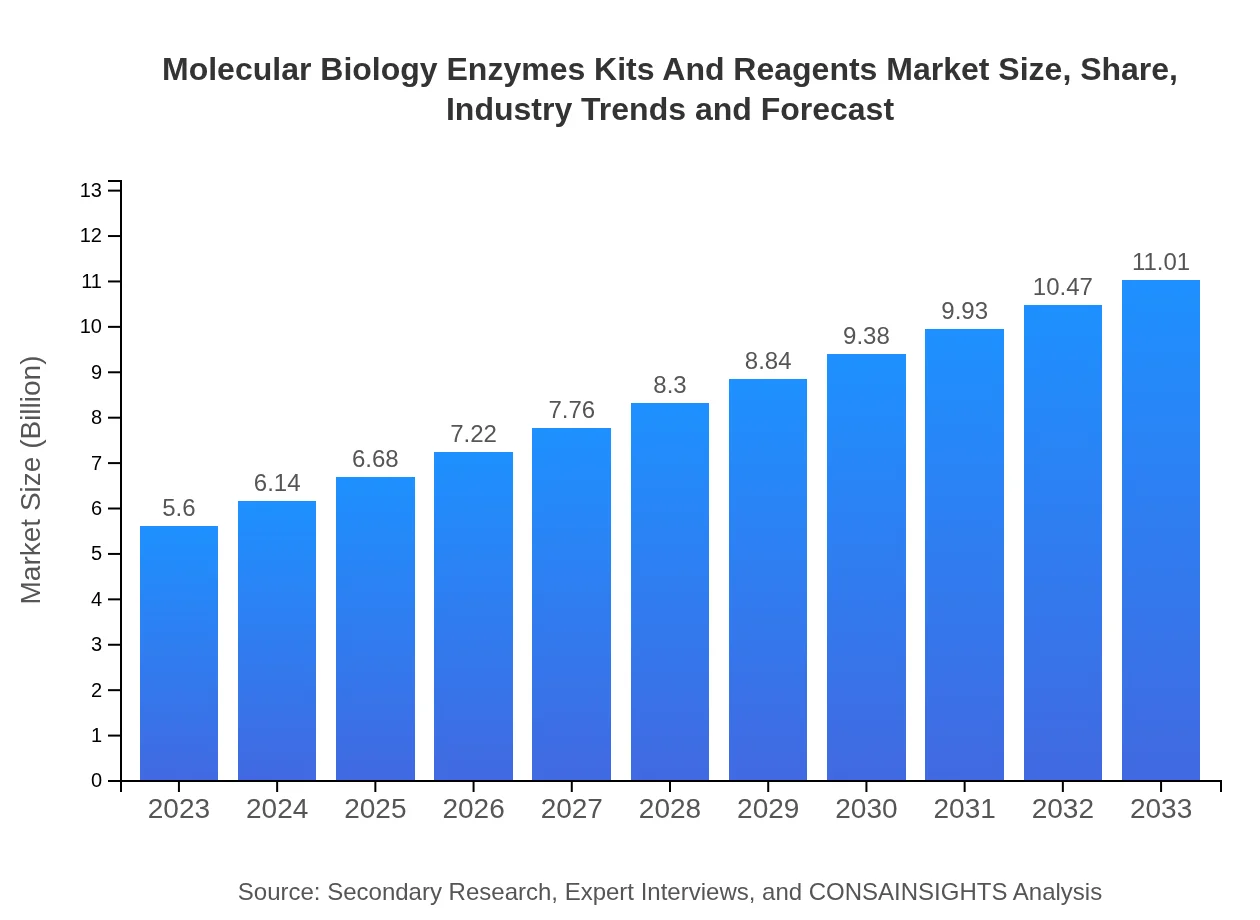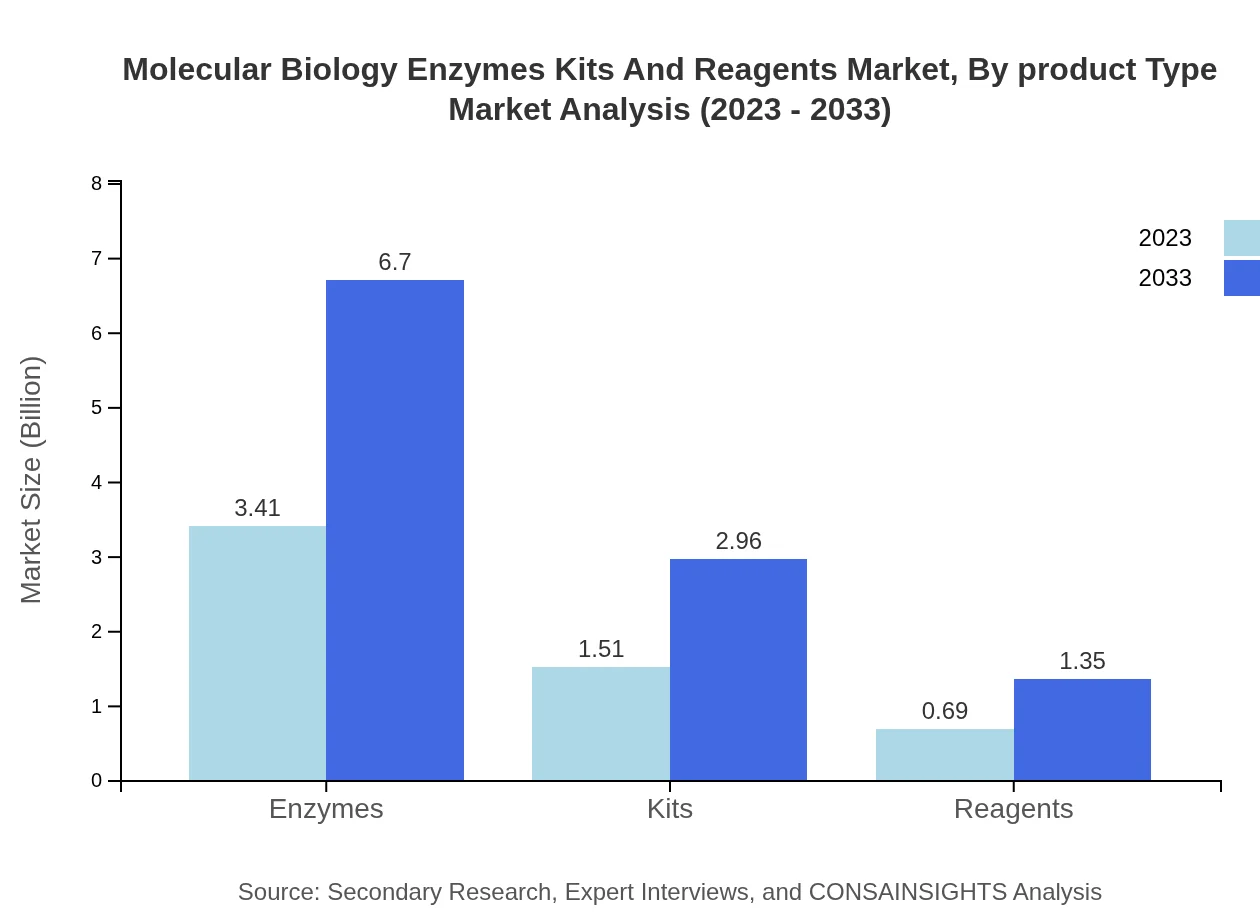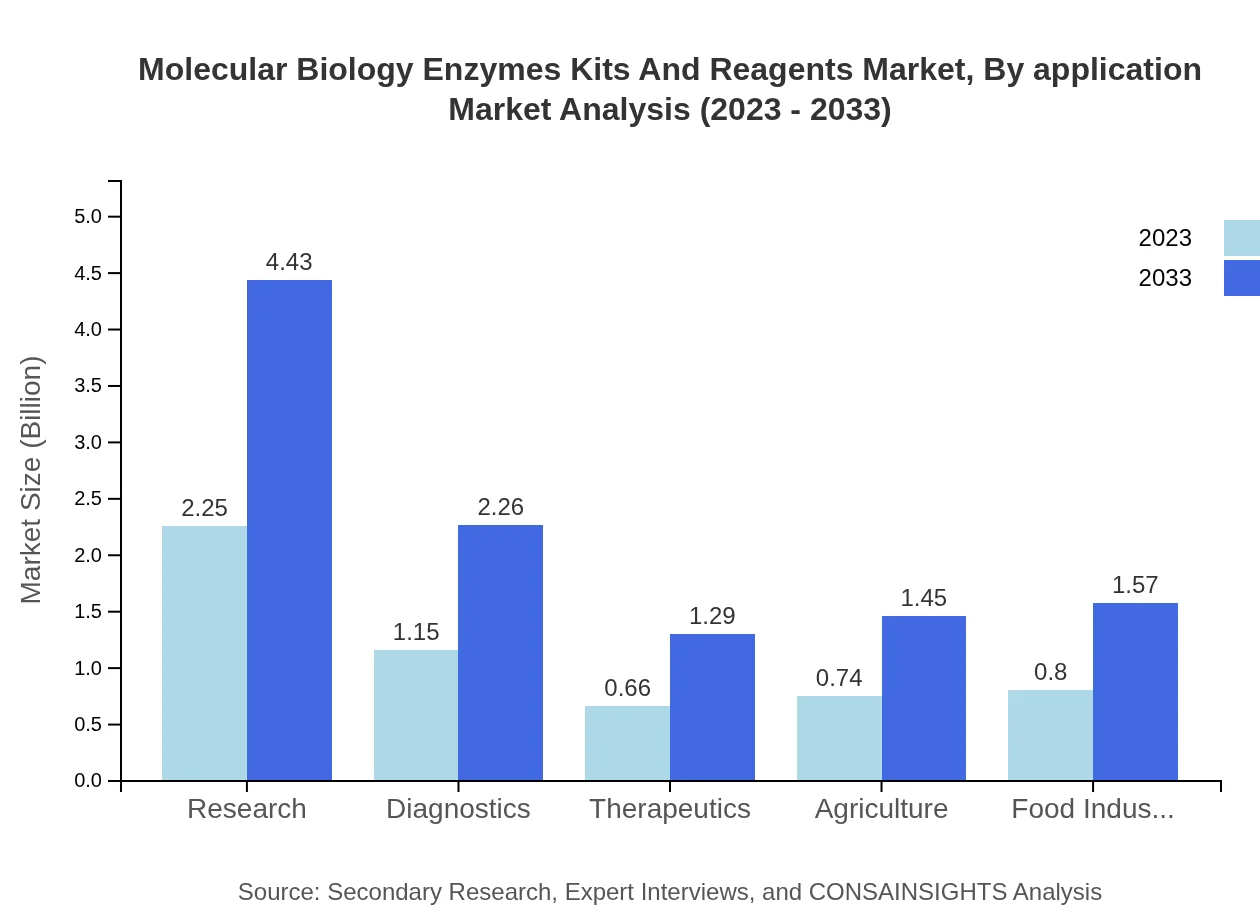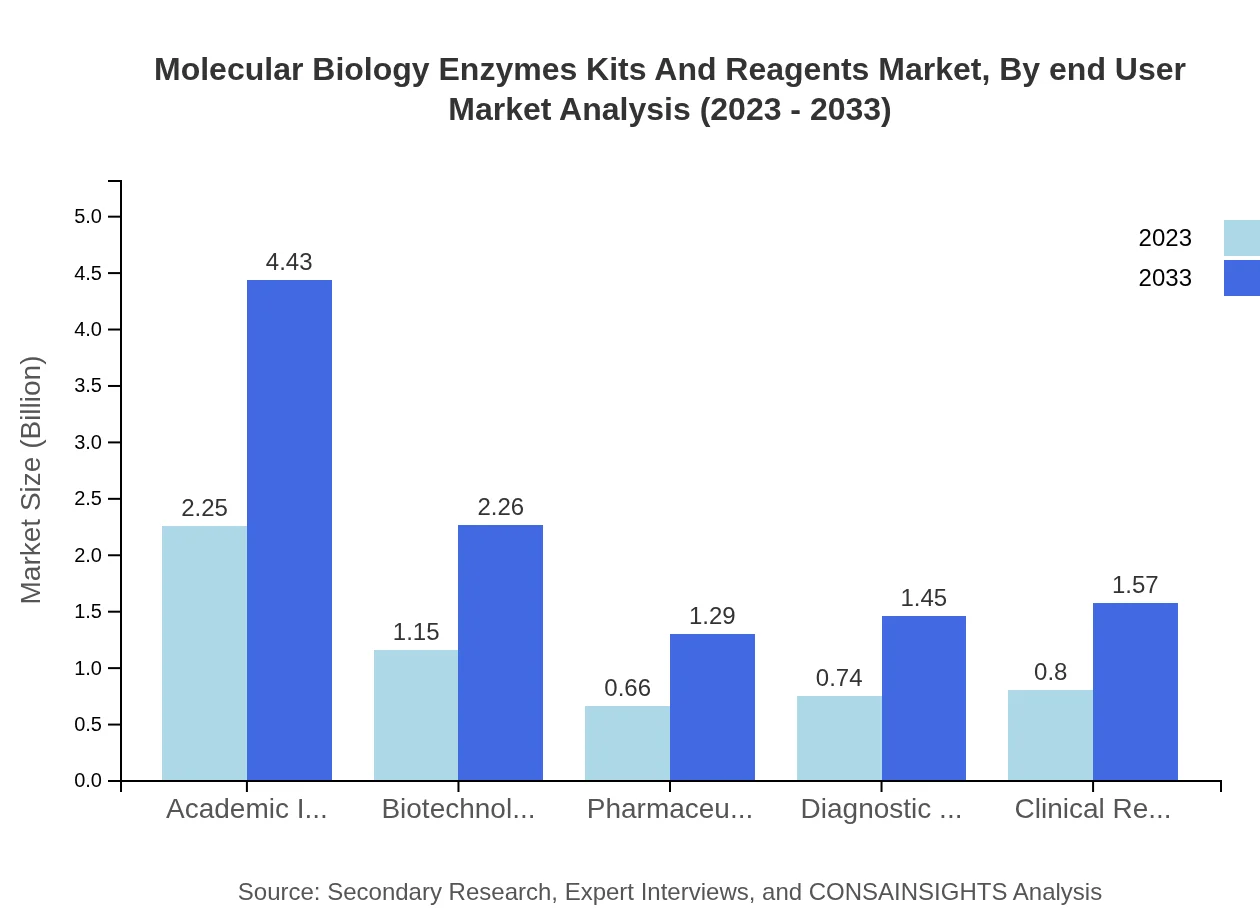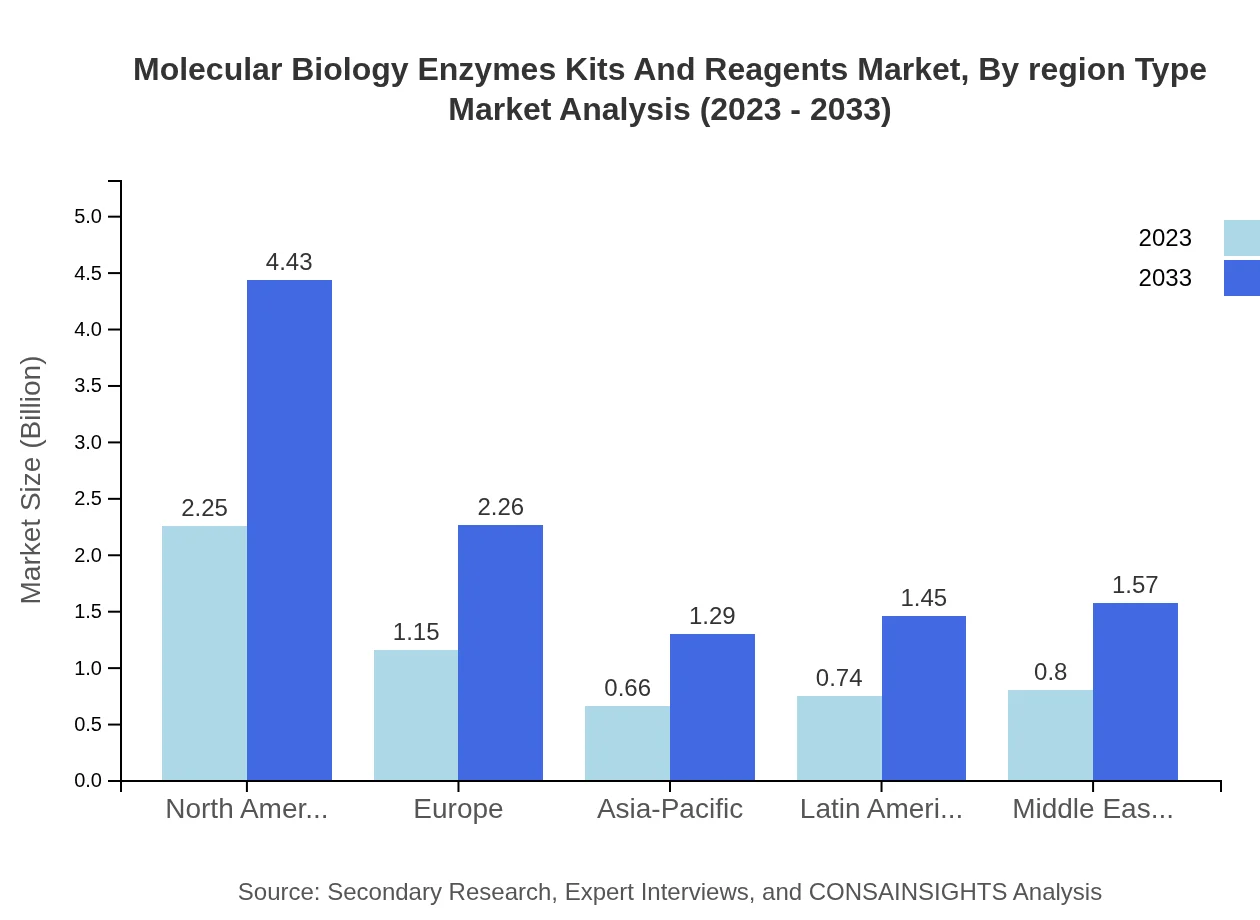Molecular Biology Enzymes Kits And Reagents Market Report
Published Date: 31 January 2026 | Report Code: molecular-biology-enzymes-kits-and-reagents
Molecular Biology Enzymes Kits And Reagents Market Size, Share, Industry Trends and Forecast to 2033
This report provides an in-depth analysis of the Molecular Biology Enzymes Kits and Reagents market, covering market size, trends, segments, and regional insights for the forecast period from 2023 to 2033.
| Metric | Value |
|---|---|
| Study Period | 2023 - 2033 |
| 2023 Market Size | $5.60 Billion |
| CAGR (2023-2033) | 6.8% |
| 2033 Market Size | $11.01 Billion |
| Top Companies | Thermo Fisher Scientific, Merck KGaA, New England Biolabs, QIAgen N.V., Agilent Technologies |
| Last Modified Date | 31 January 2026 |
Molecular Biology Enzymes Kits And Reagents Market Overview
Customize Molecular Biology Enzymes Kits And Reagents Market Report market research report
- ✔ Get in-depth analysis of Molecular Biology Enzymes Kits And Reagents market size, growth, and forecasts.
- ✔ Understand Molecular Biology Enzymes Kits And Reagents's regional dynamics and industry-specific trends.
- ✔ Identify potential applications, end-user demand, and growth segments in Molecular Biology Enzymes Kits And Reagents
What is the Market Size & CAGR of Molecular Biology Enzymes Kits And Reagents market in 2023?
Molecular Biology Enzymes Kits And Reagents Industry Analysis
Molecular Biology Enzymes Kits And Reagents Market Segmentation and Scope
Tell us your focus area and get a customized research report.
Molecular Biology Enzymes Kits And Reagents Market Analysis Report by Region
Europe Molecular Biology Enzymes Kits And Reagents Market Report:
The European market is forecasted to grow from $1.61 billion (2023) to $3.17 billion (2033). An emphasis on research innovation and compliance with stringent regulations in biotechnology sectors are key drivers of growth in this region.Asia Pacific Molecular Biology Enzymes Kits And Reagents Market Report:
The Asia Pacific region displays rapid growth potential, with the market estimated to grow from $1.10 billion in 2023 to $2.16 billion by 2033. The increasing emphasis on biotechnology research is expected to enhance market dynamics in nations like China and India.North America Molecular Biology Enzymes Kits And Reagents Market Report:
North America holds a significant share, projecting an increase from $2.01 billion in 2023 to $3.95 billion by 2033. The presence of key industry players and robust research activities contribute to this strong growth trajectory.South America Molecular Biology Enzymes Kits And Reagents Market Report:
In South America, the market is anticipated to increase from $0.36 billion (2023) to $0.71 billion (2033). Growing investments in healthcare and an increasing number of research institutions highlight the market's potential in this region.Middle East & Africa Molecular Biology Enzymes Kits And Reagents Market Report:
This region shows promising market growth from $0.52 billion in 2023 to $1.02 billion by 2033. Improved healthcare infrastructure and increasing demand for diagnostic research tools are boosting market expansion.Tell us your focus area and get a customized research report.
Molecular Biology Enzymes Kits And Reagents Market Analysis By Product Type
The segmentation by product type indicates that Enzymes dominate the market, with a size of $3.41 billion in 2023 and expected to reach $6.70 billion by 2033, holding 60.88% market share. Kits and Reagents follow, with growth projections to $2.96 billion and $1.35 billion by 2033 respectively.
Molecular Biology Enzymes Kits And Reagents Market Analysis By Application
Applications of molecular biology techniques are broad, with academic research being the largest segment at $2.25 billion in 2023, anticipated to reach $4.43 billion by 2033, maintaining a 40.23% market share. Other significant applications include diagnostics and therapeutics.
Molecular Biology Enzymes Kits And Reagents Market Analysis By End User
Key end-users include academic institutions, biotech companies, and pharmaceutical firms. Academic institutions are projected to dominate both in size ($2.25 billion in 2023) and share (40.23%), followed by biopharmaceuticals with a market size of $1.15 billion expected to grow to $2.26 billion by 2033.
Molecular Biology Enzymes Kits And Reagents Market Analysis By Region Type
The analysis by region accentuates North America and Europe as leading markets, leveraging strong research funding and biotechnology advancements. Asia-Pacific shows remarkable growth potential due to expanding healthcare initiatives and increasing research investments.
Molecular Biology Enzymes Kits And Reagents Market Trends and Future Forecast
Tell us your focus area and get a customized research report.
Global Market Leaders and Top Companies in Molecular Biology Enzymes Kits And Reagents Industry
Thermo Fisher Scientific:
A leader in molecular biology products, Thermo Fisher Scientific offers a wide array of reagents and instruments essential for genetic research and diagnostics.Merck KGaA:
As a prominent supplier, Merck KGaA specializes in life science products, particularly molecular biology kits and reagents, driving innovation in the biotechnology sector.New England Biolabs:
New England Biolabs is renowned for its extensive portfolio of enzymes and reagents, providing tools for scientists in genomics and proteomics research.QIAgen N.V.:
QIAgen excels in the development of sample preparation technologies and stands out for its high-quality molecular kits for various applications.Agilent Technologies:
Agilent Technologies offers specialized tools for molecular biology research, focusing on analytics, microfluidics, and genomic assays.We're grateful to work with incredible clients.









FAQs
What is the market size of molecular Biology Enzymes Kits And Reagents?
The molecular biology enzymes kits and reagents market size was valued at approximately $5.6 billion in 2023, with an expected CAGR of 6.8% from 2023 to 2033, indicating robust growth driven by advances in genomic research.
What are the key market players or companies in this molecular Biology Enzymes Kits And Reagents industry?
Key players in the molecular biology enzymes kits and reagents market include Thermo Fisher Scientific, Agilent Technologies, QIAGEN, New England Biolabs, and Roche. These companies play a crucial role in providing innovative solutions and driving the market forward.
What are the primary factors driving the growth in the molecular Biology Enzymes Kits And Reagents industry?
Growth in the molecular biology enzymes kits and reagents industry is driven by increasing demand for genetic testing, advancements in biotechnology, rising research funding, and the growing prevalence of chronic diseases necessitating advanced diagnostic solutions.
Which region is the fastest Growing in the molecular Biology Enzymes Kits And Reagents?
The Asia-Pacific region is the fastest-growing market for molecular biology enzymes kits and reagents, projected to grow from $1.10 billion in 2023 to $2.16 billion by 2033, reflecting an increasing emphasis on research and development in biotechnology.
Does ConsaInsights provide customized market report data for the molecular Biology Enzymes Kits And Reagents industry?
Yes, ConsaInsights offers customized market report data tailored to specific needs in the molecular biology enzymes kits and reagents industry, providing insights and analysis that cater to individual client requirements.
What deliverables can I expect from this molecular Biology Enzymes Kits And Reagents market research project?
From the molecular biology enzymes kits and reagents market research project, expect in-depth reports including market analysis, segment insights, competitive landscape, market trends, and projections for future growth segmented by regions and applications.
What are the market trends of molecular Biology Enzymes Kits And Reagents?
Current trends in the molecular biology enzymes kits and reagents market include increasing investments in genomics, a rising number of collaborations for research initiatives, advancements in CRISPR technology, and increased demand for more precise and effective diagnostic tools.

